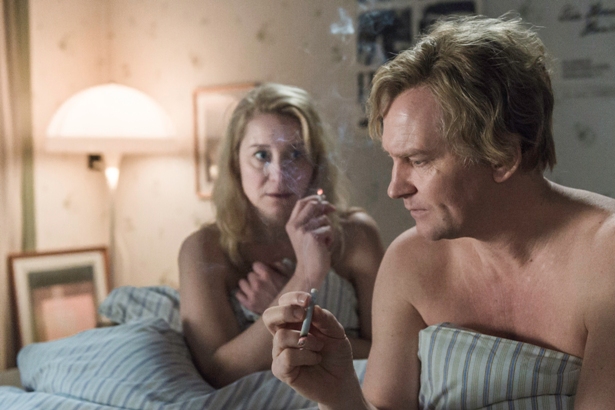Stretching relations till they snap is Thomas Vinterberg’s abiding theme. In his iconoclastic, Dogme 95-instigating youth, accusations of incest and gross bad manners smashed the respectable veneer of Festen’s family. In his fiercely gripping comeback The Hunt, Mads Mikkelsen was violently ostracised from his small community when falsely accused of child abuse. Now The Commune looks at the titular try for an ideal community in 1975 Copenhagen, and its fracture due to the usual human failings. But this time Vinterberg, who was himself raised in a commune, warmly applauds the attempt.
Architecture professor Erik (Ulrich Thomsen) is the lucky inheritor of his capacious family home in an upscale neighbourhood. But his TV newscaster wife Anna (Trine Dyrholm, pictured below with Thomsen) easily persuades him not to cash in its million-kroner worth, instead bringing in old friends and total strangers to fill its rooms. “I need to hear other people speak,” she wistfully tells her husband of 15 years, as their 14-year-old daughter Freja (Martha Sofie Wallstrøm Hanse) looks watchfully on.
 This breaking of convention is blissful and very funny at first. Being Danes, they celebrate by stripping off and jumping in the sea. Anna looks lit up by the change, giddy with the freewheeling conversations around communal meals. Erik’s bourgeois self is, though, reconstructed by cowboy builders. Thomsen, formerly the raging son who brought Festen’s patriarchal facade crashing down, plays him uptight. Barking clipped sentences and buttoning up emotions, a fuming, authoritarian meltdown makes him faint. Feeling ignored, he’s willingly seduced by his student Emma (Helene Reingaard Neumann, pictured below with Thomsen), a version of his glamorous blonde wife 20 years ago.
This breaking of convention is blissful and very funny at first. Being Danes, they celebrate by stripping off and jumping in the sea. Anna looks lit up by the change, giddy with the freewheeling conversations around communal meals. Erik’s bourgeois self is, though, reconstructed by cowboy builders. Thomsen, formerly the raging son who brought Festen’s patriarchal facade crashing down, plays him uptight. Barking clipped sentences and buttoning up emotions, a fuming, authoritarian meltdown makes him faint. Feeling ignored, he’s willingly seduced by his student Emma (Helene Reingaard Neumann, pictured below with Thomsen), a version of his glamorous blonde wife 20 years ago.
 Dyrholm, who won Berlin’s Best Actress Silver Bear for her performance, makes Anna the ensemble’s emotional heart. Trying to embrace the new, freer world they’ve created, she receives Erik’s blunt announcement of his affair with kindness. After a while, she suggests Emma join them in the commune. But the strain of sleeping alone while Erik ignores her for work and her youthful replacement is too much. In a harrowing scene, the empty, shadowy limbo of the TV studio faces her as, seconds before a news broadcast, tears start to fall. Twice in the film, she watches her hand pass through golden sunlight, as if touching the future she wants. But it’s too hard to grasp.
Dyrholm, who won Berlin’s Best Actress Silver Bear for her performance, makes Anna the ensemble’s emotional heart. Trying to embrace the new, freer world they’ve created, she receives Erik’s blunt announcement of his affair with kindness. After a while, she suggests Emma join them in the commune. But the strain of sleeping alone while Erik ignores her for work and her youthful replacement is too much. In a harrowing scene, the empty, shadowy limbo of the TV studio faces her as, seconds before a news broadcast, tears start to fall. Twice in the film, she watches her hand pass through golden sunlight, as if touching the future she wants. But it’s too hard to grasp.
When his parents divorced and left their commune, Vinterberg chose to stay till he was 19. This autobiographical core warms his film, willing its ad hoc family on. Soundtracked by Danish folk-rock and “Goodbye Yellow Brick Road”, wistful optimism remains even as the odds against a non-nuclear bridgehead into a changed society grow. Anyone who’s shared houses, or lived looser than they do now, will recognise the strong bonds and stimuli The Commune recalls and yearns for. Like Lukas Moodyson’s even sunnier evocation of a 1970s Swedish equivalent, Together, Vinterberg still doesn’t believe growing respectability and constricting social circles are the best we can hope for. Though it becomes a gentle tragicomedy, his film honours its characters’ Eden.
Overleaf: watch the trailer for The Commune















Add comment